Review HTC Gratia Communicator
Closely closer to the understanding that "Android is supposedly great," but can not decide on the device? I understand - they have so far produced them that sometimes leading analysts are confused in names) But for that, reviews are written to give users an idea of what each device is - I, for example, today decided to tell about a relatively new communicator HTC, banner with which has been spinning for a week on Habré. A sort of golden mean lineup. Caution, a lot of pictures.
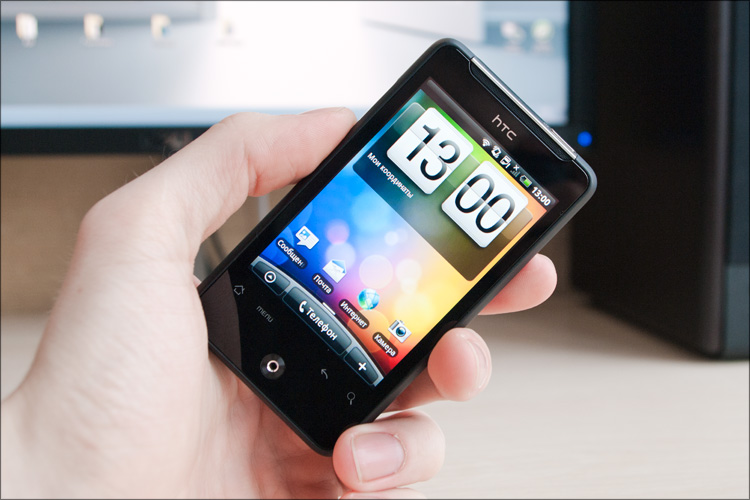
For the first time I learned about this communicator by chance, in the competition of workplaces " Personal Space " - it was conducted by the company in its official group on Vkontakte. Not that this phone was vital to me ... but I decided to take part , try my luck. Well, then you know ... but no, you don’t know - if you thought that I won this contest or they gave it to me for “ this is Bumburum! “Then you should doubt your intuition. The communicator went to a more worthy competitor, and I had nothing left to do but to continue preparing the workplace to increase the chances in other competitions)
')
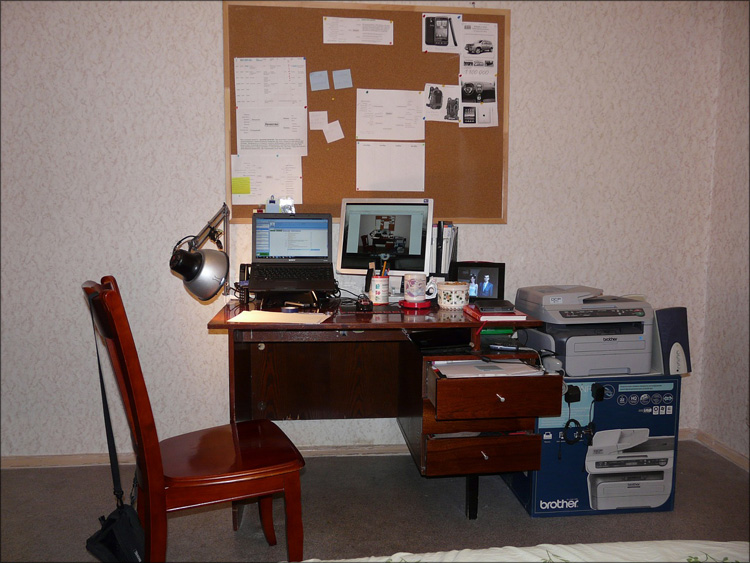
So, HTC Gratia (aka HTC A6380, it’s also the European equivalent of the American HTC Aria) is a mid-range android-communicator, one of its smallest representatives. Take a look at the specifications:
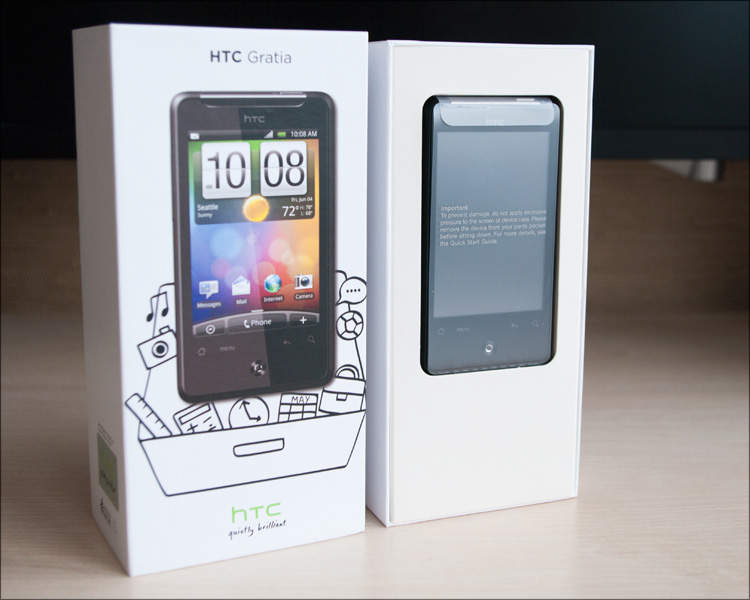
Operating system : Android 2.2 (Froyo) with HTC Sense shell
Communications : GSM / EDGE 850/900/1800/1900 MHz, UMTS / HSDPA 900/2100 MHz
Platform : Qualcomm MSM7227, 600 MHz processor
Memory : 384 MB of RAM, 512 MB of ROM and slot for microSD memory card (2 GB card included)
Interfaces : Wi-Fi (802.11b / g, possibly “n”), Bluetooth 2.1 + EDR, microUSB, 3.5 mm miniJack for headset
Screen : 3.2 "(TFT, 65 thousand colors, 480x320), touch, capacitive type
Camera : 5 MP with autofocus, no flash
Navigation : Qualcomm's gpsOne chip (with A-GPS support)
Optional : FM-radio, light sensor, proximity sensor, accelerometer, wear-resistant screen
Battery : Li-Ion, 1200 mAh
Dimensions : 103.8 x 57.7 x 11.7 mm
Weight : 115 g
Price : in Russia, the device is sold from 14,000 to 16,500 rubles - “white” ones that are more expensive.
The box is another brick - exactly the same are sold by many other devices of the company. If I worked in the HTC warehouse, then I would sell the devices in plastic bags, and from the boxes I would build a country house)

The package is quite typical:
- Communicator HTC Gratia
- Battery
- USB-microUSB wire
- Charger
- Wired stereo headset
- Clip for headset and "pads"
- Papers
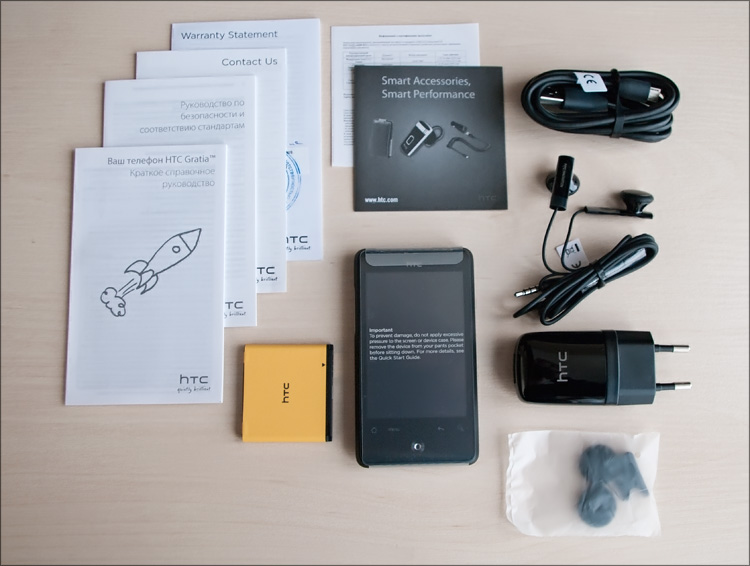
Briefly tell about the "little things". USB-microUSB wire is used to connect to a computer, and to charge through the charger. The adapter is very small and it has a fixed "Russian" plug - perhaps this is a feature of the certified delivery, as usually a removable European plug is also included in the kit. The headset is wired - if you put it on, then approximately at the level of your chest you will find a rather functional console - for controlling music and calls. But I don’t use it all, so I immediately removed it. Later it was also learned that a 2 GB memory card is preinstalled inside.
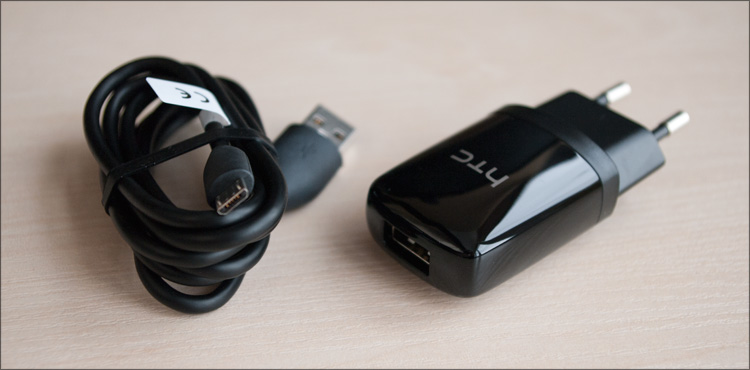
From the papers - a brief guide, a booklet with accessories, contact information and warranty. There is no detailed instruction - apparently, a subtle hint that it is not needed) Actually, there is an instruction, but it is located directly on the phone itself - if you are new to Android, then be sure to look there.
Despite the fact that the appearance of this device is exactly the same as that of the WM-communicator HTC HD mini, Gratia is graceful in its own way. When you take the HTC Gratia communicator in your hands, you feel all its “grace” - this is such a miniature monolithic phone that fits comfortably in any, even the smallest pen. For the first few minutes it even seemed to me that he was a toy, but after the first start he realized that everything was more than serious and real. Nevertheless, I still can not part with the feeling that this phone is primarily intended for girls.
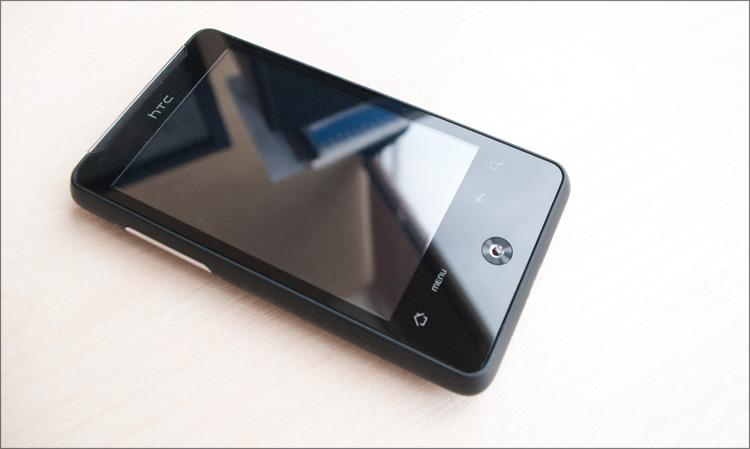
The device is noticeably smaller than the HTC HD2 - in the hand “grace” seems like a small mobile phone. This has both advantages (compactness, lower power consumption of the screen) and minuses (the big screen is always nice). Gratia versus HD2 and Cowon D3:
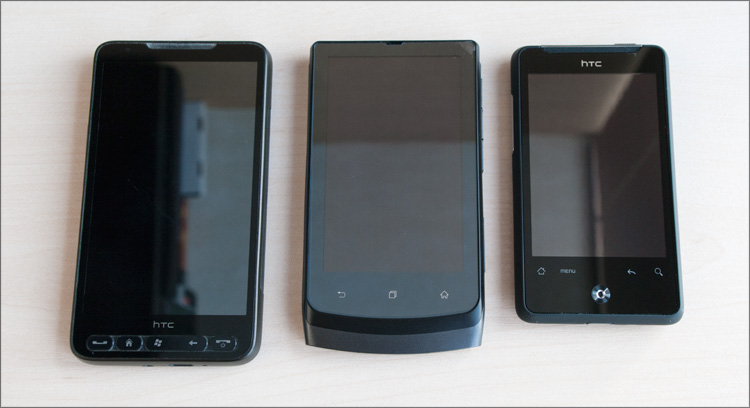
The entire front side is covered with wear-resistant glass, which has recently been installed in many (if not all) communicators of this brand. Demonstration of screen strength, especially for those who do not believe:
The second part of the device is a large soft-touch back cover. It comes in three colors - black, dark green and white, with a white semi-gloss coating. I don’t know how it is on other versions, but on the black cover sometimes small stains remain - if the hands are wet or dirty.
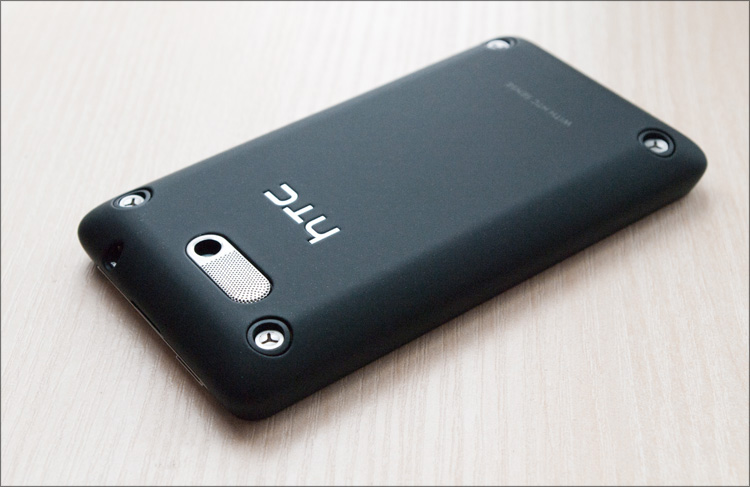
Everything, the whole body consists of only two parts, even the sides and they are part of the cover. Although no, there are some small “blotches” in the form of buttons, a speaker, a camera and connectors.
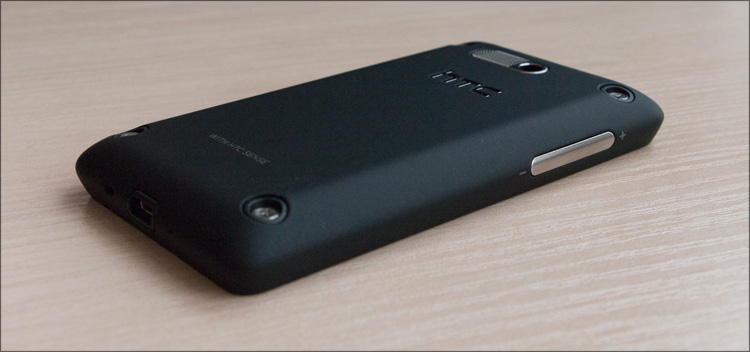
There is an oblong speaker with a fine grid in front of it - approximately the same as mine in HD2, so it will be dusty in the same way. Below them is a status indicator, a light sensor and a proximity sensor to the ear.
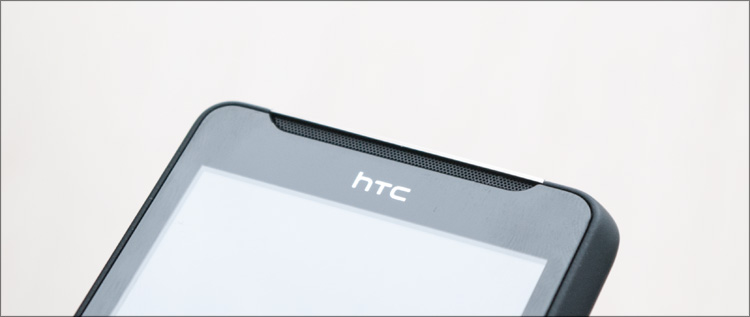
A few more standard Android buttons are located immediately below the screen, but they are all touch-sensitive (highlighted in white in the dark). “Real” is perhaps an optical trackball, with which it is sometimes very convenient to navigate through virtual tables or menus. Such a solution has already been encountered in some HTC communicators, and before its appearance, a full-fledged "ball" of the type of the HTC P3300 was no less fashionable. Now I remembered this “old man” and even felt sad - how many years did he serve me faithfully!
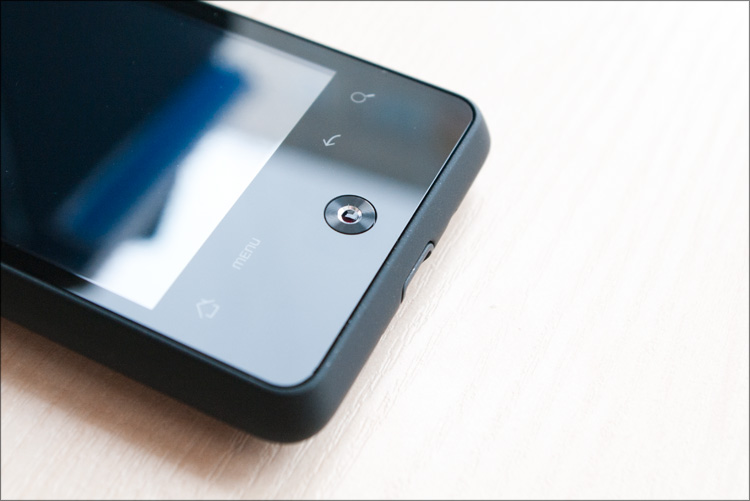
On the left, there is one continuous volume “rocker”, rather raised. But on the right is completely empty - there is not even a camera button, which is somewhat frustrating; This means that you can turn on the camera only through the icon in the menu or on the desktop, and you will have to take pictures by pressing a button on the screen. Sometimes it is inconvenient, although on HD2 the same problem and, in principle, you can live with it. But on the other hand, nothing prevented this button from doing anything.
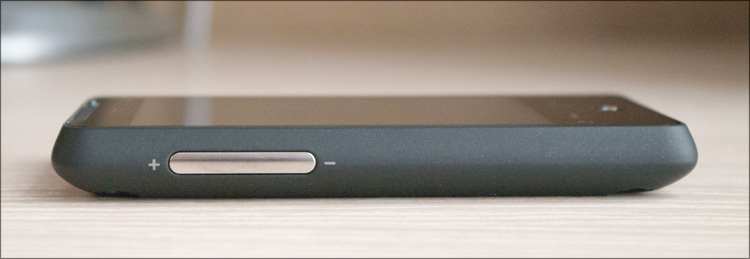
At the bottom there is a microUSB connector (for charging and syncing), a microphone and a hole for attaching the strap.
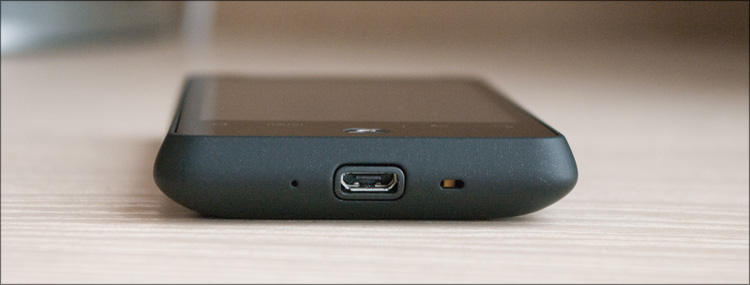
As you already noticed, there is a camera and a speaker behind, and metal screws in the corners of the case. Perhaps they perform only a decorative function - unfortunately, there was no suitable tool at hand to check it. But in general, the case is very well assembled, it does not creak and does not crack under compression.

In the black and black "Gracia", under the black and black battery cover ... there is a yellow-yellow frame of the communicator, inside of which there is a place for a yellow-yellow battery. In the same place - a slot for a SIM card and for a microSD card.
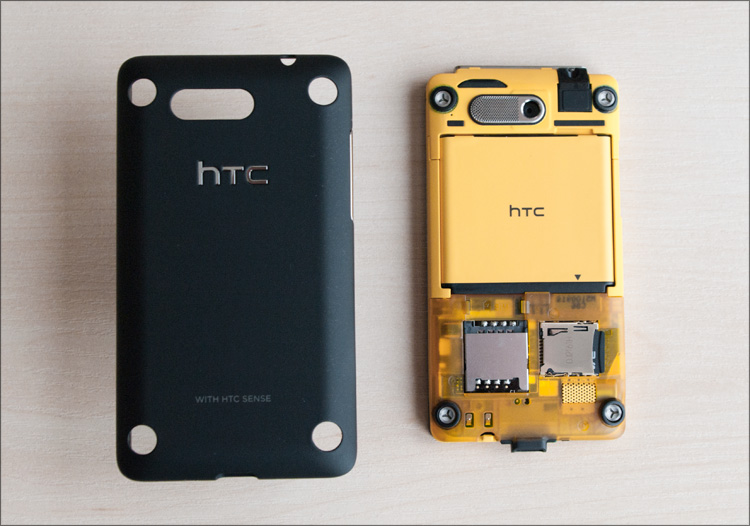


I forgot to mention the power button, which is located on a special metal insert of the upper edge of the device. Such an insert looks very appropriate and impressive, but in practice, the button itself seemed to me not very convenient and that is why. When you take the device into the palm of your hand, it is convenient to press this button with only one finger, the index finger. But the problem here is that the upper side has a trapezoidal shape, and the power button is located on its front side - in this case, the index finger has to try to press this button, bending around the upper side. But, again, most likely this is a matter of habit.
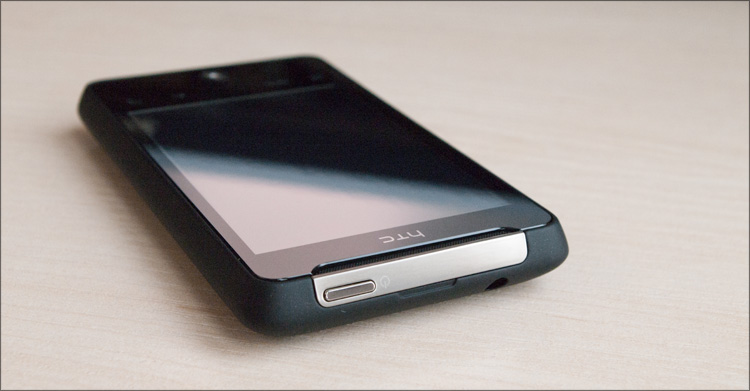
On the top there is a 3.5mm jack for connecting a stereo headset or any other headphones. It's nice that they did not get hung up on the sound output via microUSB.
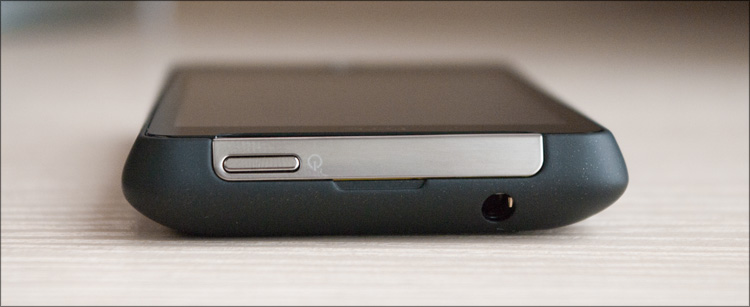
When I inserted the battery and SIM card, I returned the back cover to its rightful place and found another small constructive flaw. The "eye" of the camera is located directly on the frame of the communicator, and there is only a small cutout in the lid under it. Accordingly, the difference in levels (chamber and cover) form a small cavity into which dirt will clog. You can simply remove the cover and blow out all the dirt, but if the phone falls, for example, in the snow, you just can’t remove the snow from the camera with your sleeve.

And the last point regarding the appearance. If you remove the back cover, the phone becomes even smaller, with “sharp” edges of the screen - in this form it looks very unusual and, in my opinion, even better. It would be great if someone from the manufacturers made a device with a similar design.
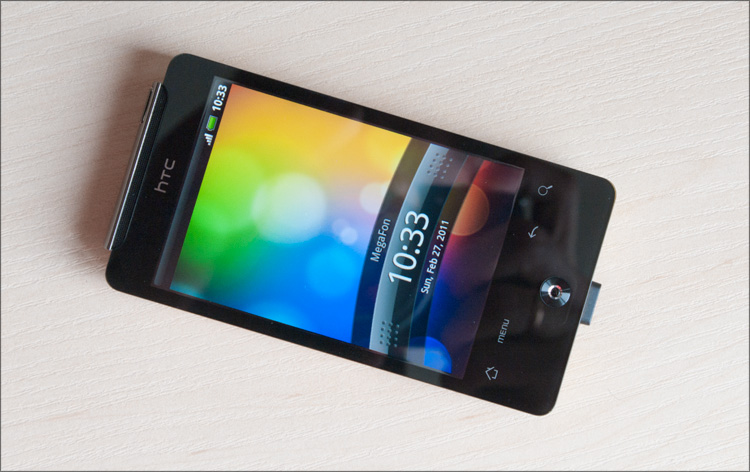
It’s not so interesting to talk about it, since Android is all alone and only a few are bothering to make something of it). Okay, let's take everything in order, but in short.
The first switch-on takes about a minute - after the initial setup (it’s about 5 minutes for a beginner), you can start using the device. The next time the device was loading for 20 seconds, although I don’t remember exactly - I very rarely turn off the phone even for the night, preferring to set the mode “on the plane”. There is full support for the Russian language.
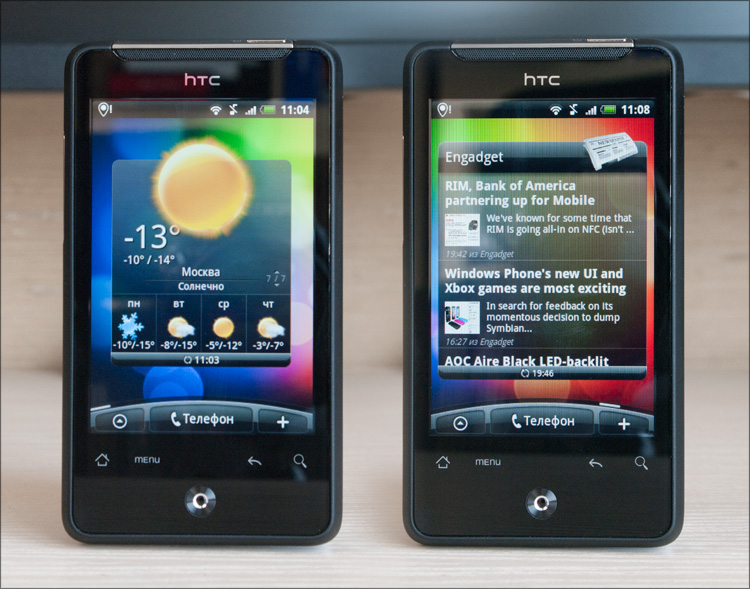
HTC Gratia uses Android 2.2, and along with it, the familiar HTC Sense interface is almost the same as in all Android devices of the company (Gratia does not support HTCSense.com service). I still consider this shell to be one of the best, and in all plans - starting with the appearance and convenience of moving around the screen, ending with its functionality; shortcuts, widgets - whatever. I liked the opportunity to change the design presets - there are several of them, from minimalism to all-in-one.
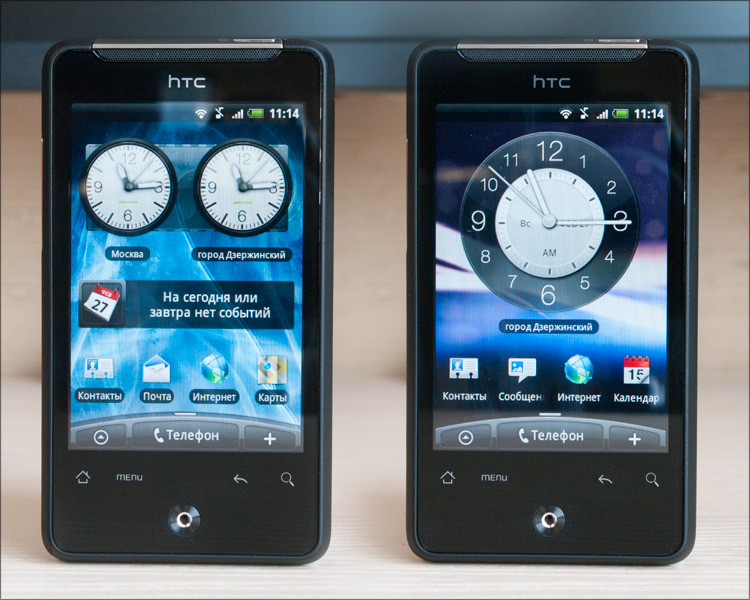
Initially, there are 7 desktops - despite not the most outstanding technical specifications ( Qualcomm MSM7227 platform, 600 MHz processor), the communicator does not slow down with the content that is on these screens (unlike the HTC HD mini, which lacked resources for high-quality work pre-installed Windows Mobile). If, however, everything is superfluous (all sorts of promotions, news, facebook, etc.), then even the most picky users will like the speed of work. I don’t know, however, how things will be when there are hundreds of contacts, calls and messages in the phone, but overall the impressions are positive.

The device has 384 MB of RAM and 512 MB for data storage (of which about 200 MB is initially free). As a memory for storing photos and music, you can use a microSD memory card, although a 2 GB card is inserted initially.
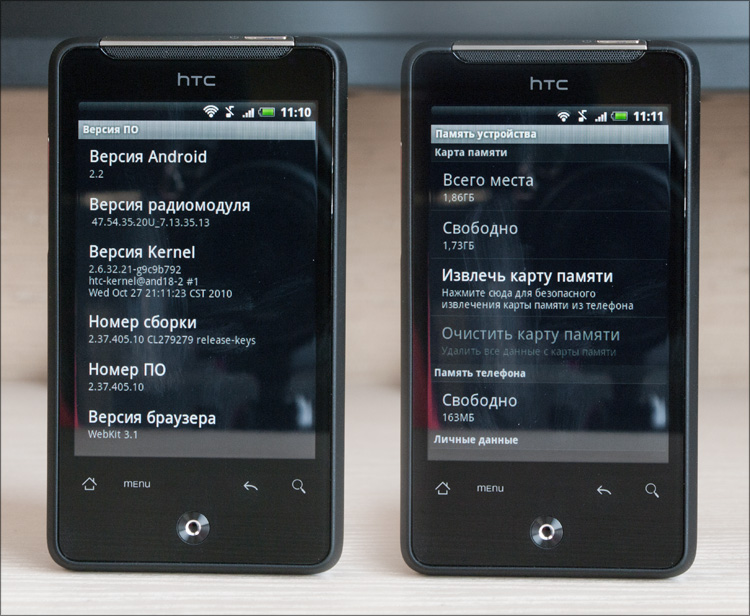
What I liked was the screen - even if it has only 65 thousand colors and it noticeably goes blind in the sun (made with TFT technology, capacitive), but the advantages are more - scratch resistance (as in HD2), almost 180-degree viewing angles and excellent color reproduction, which you pay attention to when you first turn it on.
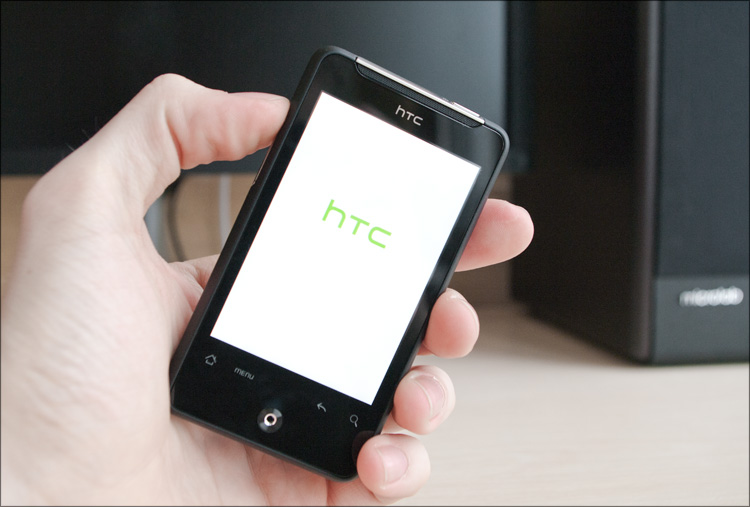
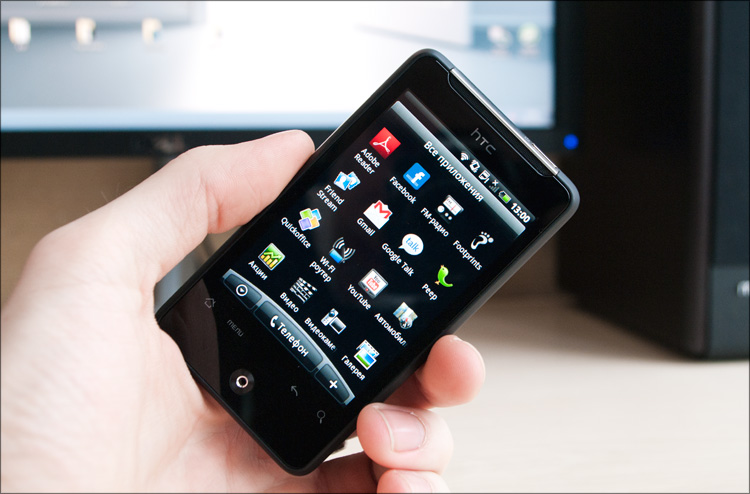
The physical dimensions of the screen dictate the size of the device itself, so the screen is relatively small (3.2 ″, 67x45 mm) and sometimes this seems really small. But after a few minutes, I quietly typed on the Swype keyboard (although the original one is very convenient), so again, it’s all a matter of habit. But in this modest screen they fit the HVGA resolution (320x480) - there is not even a hint of any pixelation.
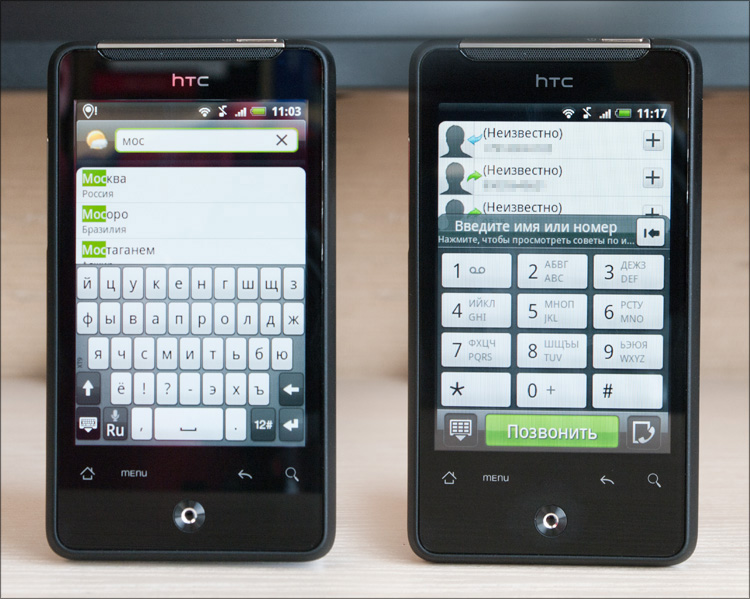
The camera without excesses - it is useful unless occasionally to capture something. First of all, as I said, there is no hardware button for launching the camera and for creating snapshots - you have to press a trackball or use an alternative software, otherwise it is quite difficult to take a clear picture. Secondly, there is no flash, and without it, in the absence of good daylight, not the best shots are also obtained - judge for yourself from the photo. On the other hand, in many devices of this segment, cameras are put similar in quality. In addition to photos (ranging in size from 640x480 to 2592x1728), you can also write video up to 640x480 @ 30fps.
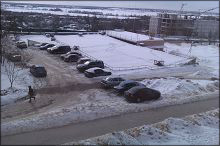

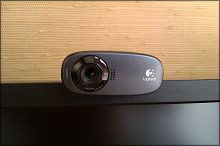


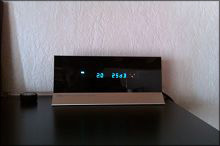
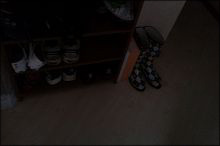
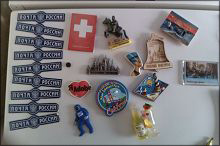
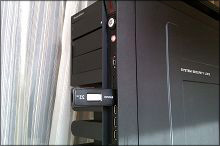
The device supports Mass Storage , so that the phone can always be connected as a removable disk to any computer in order, for example, to download music or drop pictures. Other interface features include Bluetooth 2.1 + EDR support, Wi-Fi (802.11b / g, possibly “n”) and enough functionality to be a Wi-Fi router for distributing 2G / 3G connectivity.
The set of applications is standard:
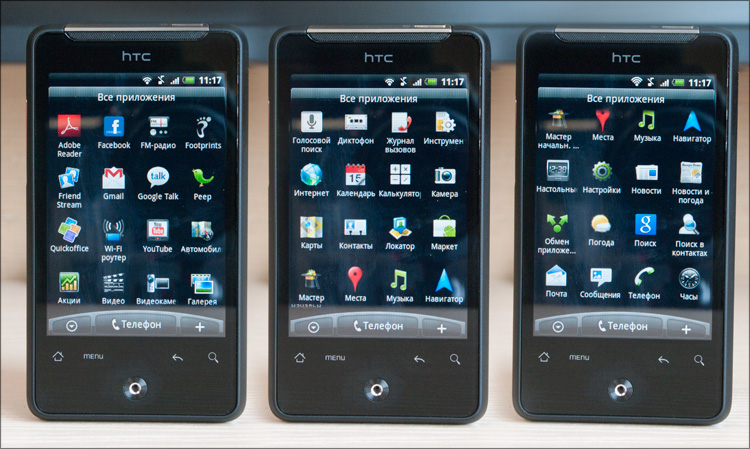
Although somewhat surprised by the lack of pre-installed navigation software ( Google Maps 4.5 does not count), despite the presence of a GPS module in the Qualcomm platform ( GPSOne ).
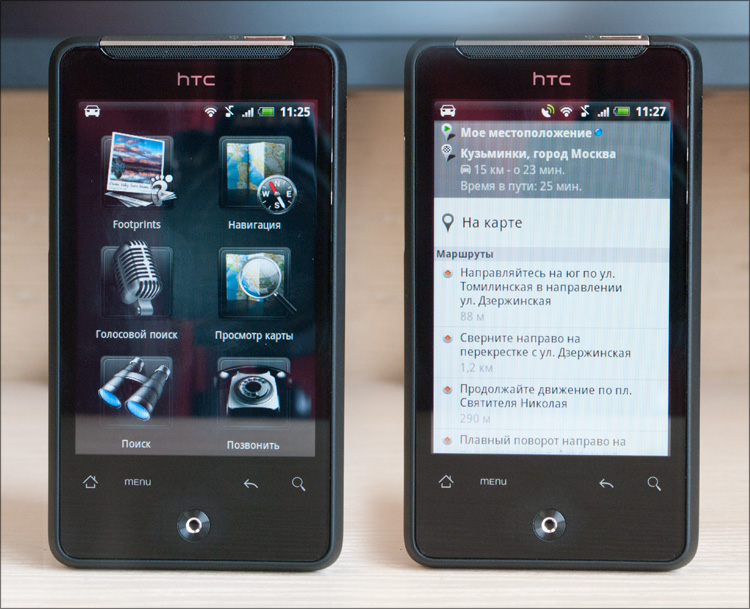
But there is an FM radio with RDS support - it catches quite tolerably, but only with a connected headset. As for playing music - in this regard, everything is not bad, if you put some alternative player (the same WinAMP ). Video can also be watched, and even unconverted (within reason; 720p is already unreasonable)), but, again, only in some third-party player.
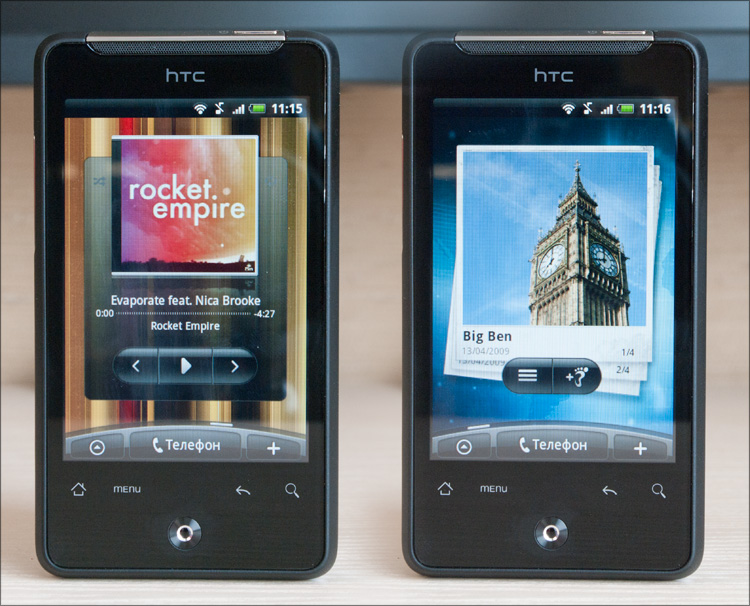
You, probably, have already noticed that the article does not have “sharp” screenshots of the device interface? Yes, this is one of the existing problems - even on w3bsit3-dns.com I did not find information about getting the root on HTC Gratia, at least temporary. And, no less strange, the phone was never seen through the SDK - I run ddms, but there is no phone and that's it. USB debug is enabled, the SDK itself is configured - my HD2 with android seems to be there without problems. Maybe I did something wrong, but including for this reason I am not writing in great detail about the software, putting only the most interesting pictures.

The operating time here is an order of magnitude better than in HD2 or in Desire HD / Z - mainly due to the smaller diagonal of the screen and a less nimble processor. The battery is the most common, 1200 mAh - in the “phone is in your pocket” mode, it easily works for several days, but if you call, write sms and tweets, check email and listen to music on the road, you will have to charge every night. The phone is able to work longer than 1 day, but the battery will not be enough for 2 days - what could be worse than the phone in the middle of the day? Exactly.
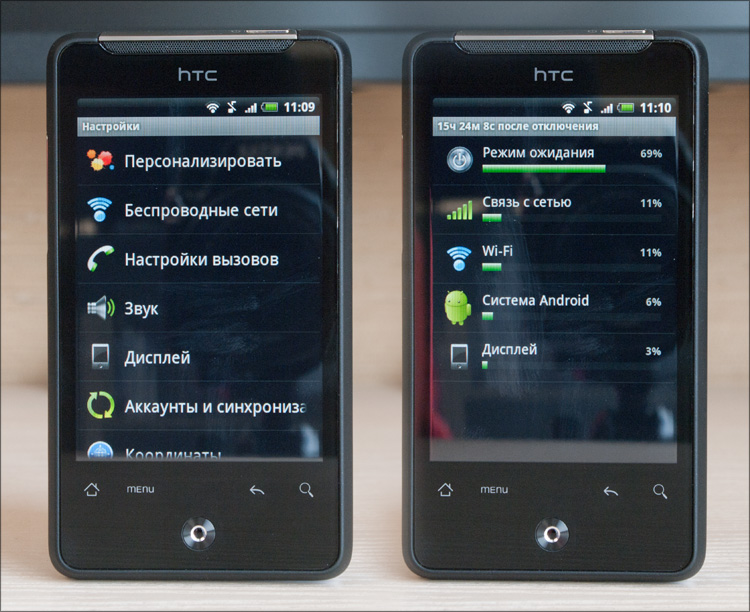
And the last. In some reviews, readers saw on the desktop of my computer an attractive watch, exactly the same as in the Sense-shell. Download to health, called HTC Home for Windows .
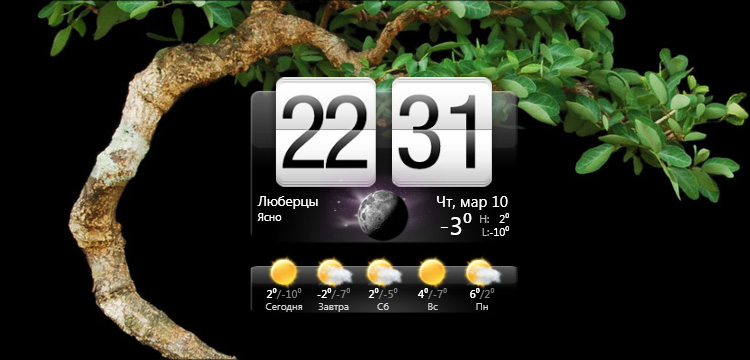
 Elegant appearance, compact size
Elegant appearance, compact size
 Practical case, wear-resistant front glass
Practical case, wear-resistant front glass
 The shell of HTC Sense, different themes
The shell of HTC Sense, different themes
 Support router function
Support router function
 Bright screen with wide viewing angles
Bright screen with wide viewing angles
 Good performance
Good performance
 Relatively quiet speaker
Relatively quiet speaker
 The screen is blind in bright sun
The screen is blind in bright sun
 The lack of a hardware camera button and flash, strange autofocus
The lack of a hardware camera button and flash, strange autofocus
Another disadvantage is my minor subjective quibbling of the hull structure (in particular, the camera’s “recessed” peephole in the back cover and the not very convenient position of the power button), but I didn’t think how to call it one line
It would seem that what only androids now does not exist! For every taste and color - from budget mobile phones (for those who just want to join the robo-tus) to flagship shovels (which not everyone can afford). But for many, as practice shows, neither one nor the other is needed - the golden mean is still one of the best decisions of many attempts to choose. And in my opinion, Gratia just refers to this middle - even if the price is tall, but we get a quality product in every sense. And, of course, stylish - what are only three different colors of the case instead of “one more black faceless device” ... just for those who are guided by the principle “like this, but this doesn't”.
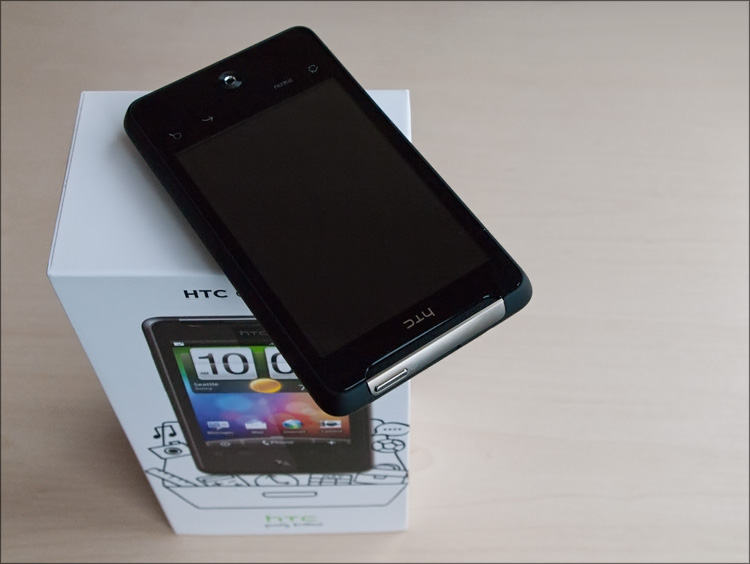
It remains to hope that the device will find deserved support on specialized resources - then it will be very cool!

For the first time I learned about this communicator by chance, in the competition of workplaces " Personal Space " - it was conducted by the company in its official group on Vkontakte. Not that this phone was vital to me ... but I decided to take part , try my luck. Well, then you know ... but no, you don’t know - if you thought that I won this contest or they gave it to me for “ this is Bumburum! “Then you should doubt your intuition. The communicator went to a more worthy competitor, and I had nothing left to do but to continue preparing the workplace to increase the chances in other competitions)
')

So, HTC Gratia (aka HTC A6380, it’s also the European equivalent of the American HTC Aria) is a mid-range android-communicator, one of its smallest representatives. Take a look at the specifications:

Specifications
Operating system : Android 2.2 (Froyo) with HTC Sense shell
Communications : GSM / EDGE 850/900/1800/1900 MHz, UMTS / HSDPA 900/2100 MHz
Platform : Qualcomm MSM7227, 600 MHz processor
Memory : 384 MB of RAM, 512 MB of ROM and slot for microSD memory card (2 GB card included)
Interfaces : Wi-Fi (802.11b / g, possibly “n”), Bluetooth 2.1 + EDR, microUSB, 3.5 mm miniJack for headset
Screen : 3.2 "(TFT, 65 thousand colors, 480x320), touch, capacitive type
Camera : 5 MP with autofocus, no flash
Navigation : Qualcomm's gpsOne chip (with A-GPS support)
Optional : FM-radio, light sensor, proximity sensor, accelerometer, wear-resistant screen
Battery : Li-Ion, 1200 mAh
Dimensions : 103.8 x 57.7 x 11.7 mm
Weight : 115 g
Price : in Russia, the device is sold from 14,000 to 16,500 rubles - “white” ones that are more expensive.
| * UPD * Advice from the comments : the higher price is a large markup of the store. As for gray / white in each case, HTC recommends that you feel free to call 8-800-200-4820 (Mon - Sub 09: 00- 18:00 (Mon-Fri) 09: 00- 13:00 (Sub) for free from a landline and a mobile phone) and learn from IMEI the fate of the purchased device |
Equipment
The box is another brick - exactly the same are sold by many other devices of the company. If I worked in the HTC warehouse, then I would sell the devices in plastic bags, and from the boxes I would build a country house)

The package is quite typical:
- Communicator HTC Gratia
- Battery
- USB-microUSB wire
- Charger
- Wired stereo headset
- Clip for headset and "pads"
- Papers

Briefly tell about the "little things". USB-microUSB wire is used to connect to a computer, and to charge through the charger. The adapter is very small and it has a fixed "Russian" plug - perhaps this is a feature of the certified delivery, as usually a removable European plug is also included in the kit. The headset is wired - if you put it on, then approximately at the level of your chest you will find a rather functional console - for controlling music and calls. But I don’t use it all, so I immediately removed it. Later it was also learned that a 2 GB memory card is preinstalled inside.

From the papers - a brief guide, a booklet with accessories, contact information and warranty. There is no detailed instruction - apparently, a subtle hint that it is not needed) Actually, there is an instruction, but it is located directly on the phone itself - if you are new to Android, then be sure to look there.
Appearance
Despite the fact that the appearance of this device is exactly the same as that of the WM-communicator HTC HD mini, Gratia is graceful in its own way. When you take the HTC Gratia communicator in your hands, you feel all its “grace” - this is such a miniature monolithic phone that fits comfortably in any, even the smallest pen. For the first few minutes it even seemed to me that he was a toy, but after the first start he realized that everything was more than serious and real. Nevertheless, I still can not part with the feeling that this phone is primarily intended for girls.

The device is noticeably smaller than the HTC HD2 - in the hand “grace” seems like a small mobile phone. This has both advantages (compactness, lower power consumption of the screen) and minuses (the big screen is always nice). Gratia versus HD2 and Cowon D3:

The entire front side is covered with wear-resistant glass, which has recently been installed in many (if not all) communicators of this brand. Demonstration of screen strength, especially for those who do not believe:
The second part of the device is a large soft-touch back cover. It comes in three colors - black, dark green and white, with a white semi-gloss coating. I don’t know how it is on other versions, but on the black cover sometimes small stains remain - if the hands are wet or dirty.

Everything, the whole body consists of only two parts, even the sides and they are part of the cover. Although no, there are some small “blotches” in the form of buttons, a speaker, a camera and connectors.

There is an oblong speaker with a fine grid in front of it - approximately the same as mine in HD2, so it will be dusty in the same way. Below them is a status indicator, a light sensor and a proximity sensor to the ear.

A few more standard Android buttons are located immediately below the screen, but they are all touch-sensitive (highlighted in white in the dark). “Real” is perhaps an optical trackball, with which it is sometimes very convenient to navigate through virtual tables or menus. Such a solution has already been encountered in some HTC communicators, and before its appearance, a full-fledged "ball" of the type of the HTC P3300 was no less fashionable. Now I remembered this “old man” and even felt sad - how many years did he serve me faithfully!

On the left, there is one continuous volume “rocker”, rather raised. But on the right is completely empty - there is not even a camera button, which is somewhat frustrating; This means that you can turn on the camera only through the icon in the menu or on the desktop, and you will have to take pictures by pressing a button on the screen. Sometimes it is inconvenient, although on HD2 the same problem and, in principle, you can live with it. But on the other hand, nothing prevented this button from doing anything.

At the bottom there is a microUSB connector (for charging and syncing), a microphone and a hole for attaching the strap.

As you already noticed, there is a camera and a speaker behind, and metal screws in the corners of the case. Perhaps they perform only a decorative function - unfortunately, there was no suitable tool at hand to check it. But in general, the case is very well assembled, it does not creak and does not crack under compression.

In the black and black "Gracia", under the black and black battery cover ... there is a yellow-yellow frame of the communicator, inside of which there is a place for a yellow-yellow battery. In the same place - a slot for a SIM card and for a microSD card.



I forgot to mention the power button, which is located on a special metal insert of the upper edge of the device. Such an insert looks very appropriate and impressive, but in practice, the button itself seemed to me not very convenient and that is why. When you take the device into the palm of your hand, it is convenient to press this button with only one finger, the index finger. But the problem here is that the upper side has a trapezoidal shape, and the power button is located on its front side - in this case, the index finger has to try to press this button, bending around the upper side. But, again, most likely this is a matter of habit.

On the top there is a 3.5mm jack for connecting a stereo headset or any other headphones. It's nice that they did not get hung up on the sound output via microUSB.

When I inserted the battery and SIM card, I returned the back cover to its rightful place and found another small constructive flaw. The "eye" of the camera is located directly on the frame of the communicator, and there is only a small cutout in the lid under it. Accordingly, the difference in levels (chamber and cover) form a small cavity into which dirt will clog. You can simply remove the cover and blow out all the dirt, but if the phone falls, for example, in the snow, you just can’t remove the snow from the camera with your sleeve.

And the last point regarding the appearance. If you remove the back cover, the phone becomes even smaller, with “sharp” edges of the screen - in this form it looks very unusual and, in my opinion, even better. It would be great if someone from the manufacturers made a device with a similar design.

Inner world
It’s not so interesting to talk about it, since Android is all alone and only a few are bothering to make something of it). Okay, let's take everything in order, but in short.
The first switch-on takes about a minute - after the initial setup (it’s about 5 minutes for a beginner), you can start using the device. The next time the device was loading for 20 seconds, although I don’t remember exactly - I very rarely turn off the phone even for the night, preferring to set the mode “on the plane”. There is full support for the Russian language.

HTC Gratia uses Android 2.2, and along with it, the familiar HTC Sense interface is almost the same as in all Android devices of the company (Gratia does not support HTCSense.com service). I still consider this shell to be one of the best, and in all plans - starting with the appearance and convenience of moving around the screen, ending with its functionality; shortcuts, widgets - whatever. I liked the opportunity to change the design presets - there are several of them, from minimalism to all-in-one.

Initially, there are 7 desktops - despite not the most outstanding technical specifications ( Qualcomm MSM7227 platform, 600 MHz processor), the communicator does not slow down with the content that is on these screens (unlike the HTC HD mini, which lacked resources for high-quality work pre-installed Windows Mobile). If, however, everything is superfluous (all sorts of promotions, news, facebook, etc.), then even the most picky users will like the speed of work. I don’t know, however, how things will be when there are hundreds of contacts, calls and messages in the phone, but overall the impressions are positive.

The device has 384 MB of RAM and 512 MB for data storage (of which about 200 MB is initially free). As a memory for storing photos and music, you can use a microSD memory card, although a 2 GB card is inserted initially.

What I liked was the screen - even if it has only 65 thousand colors and it noticeably goes blind in the sun (made with TFT technology, capacitive), but the advantages are more - scratch resistance (as in HD2), almost 180-degree viewing angles and excellent color reproduction, which you pay attention to when you first turn it on.


The physical dimensions of the screen dictate the size of the device itself, so the screen is relatively small (3.2 ″, 67x45 mm) and sometimes this seems really small. But after a few minutes, I quietly typed on the Swype keyboard (although the original one is very convenient), so again, it’s all a matter of habit. But in this modest screen they fit the HVGA resolution (320x480) - there is not even a hint of any pixelation.

The camera without excesses - it is useful unless occasionally to capture something. First of all, as I said, there is no hardware button for launching the camera and for creating snapshots - you have to press a trackball or use an alternative software, otherwise it is quite difficult to take a clear picture. Secondly, there is no flash, and without it, in the absence of good daylight, not the best shots are also obtained - judge for yourself from the photo. On the other hand, in many devices of this segment, cameras are put similar in quality. In addition to photos (ranging in size from 640x480 to 2592x1728), you can also write video up to 640x480 @ 30fps.









The device supports Mass Storage , so that the phone can always be connected as a removable disk to any computer in order, for example, to download music or drop pictures. Other interface features include Bluetooth 2.1 + EDR support, Wi-Fi (802.11b / g, possibly “n”) and enough functionality to be a Wi-Fi router for distributing 2G / 3G connectivity.
The set of applications is standard:

Although somewhat surprised by the lack of pre-installed navigation software ( Google Maps 4.5 does not count), despite the presence of a GPS module in the Qualcomm platform ( GPSOne ).

But there is an FM radio with RDS support - it catches quite tolerably, but only with a connected headset. As for playing music - in this regard, everything is not bad, if you put some alternative player (the same WinAMP ). Video can also be watched, and even unconverted (within reason; 720p is already unreasonable)), but, again, only in some third-party player.

You, probably, have already noticed that the article does not have “sharp” screenshots of the device interface? Yes, this is one of the existing problems - even on w3bsit3-dns.com I did not find information about getting the root on HTC Gratia, at least temporary. And, no less strange, the phone was never seen through the SDK - I run ddms, but there is no phone and that's it. USB debug is enabled, the SDK itself is configured - my HD2 with android seems to be there without problems. Maybe I did something wrong, but including for this reason I am not writing in great detail about the software, putting only the most interesting pictures.

The operating time here is an order of magnitude better than in HD2 or in Desire HD / Z - mainly due to the smaller diagonal of the screen and a less nimble processor. The battery is the most common, 1200 mAh - in the “phone is in your pocket” mode, it easily works for several days, but if you call, write sms and tweets, check email and listen to music on the road, you will have to charge every night. The phone is able to work longer than 1 day, but the battery will not be enough for 2 days - what could be worse than the phone in the middle of the day? Exactly.

And the last. In some reviews, readers saw on the desktop of my computer an attractive watch, exactly the same as in the Sense-shell. Download to health, called HTC Home for Windows .

 Advantages and disadvantages
Advantages and disadvantages
 Elegant appearance, compact size
Elegant appearance, compact size Practical case, wear-resistant front glass
Practical case, wear-resistant front glass The shell of HTC Sense, different themes
The shell of HTC Sense, different themes Support router function
Support router function Bright screen with wide viewing angles
Bright screen with wide viewing angles Good performance
Good performance Relatively quiet speaker
Relatively quiet speaker The screen is blind in bright sun
The screen is blind in bright sun The lack of a hardware camera button and flash, strange autofocus
The lack of a hardware camera button and flash, strange autofocusAnother disadvantage is my minor subjective quibbling of the hull structure (in particular, the camera’s “recessed” peephole in the back cover and the not very convenient position of the power button), but I didn’t think how to call it one line
findings
It would seem that what only androids now does not exist! For every taste and color - from budget mobile phones (for those who just want to join the robo-tus) to flagship shovels (which not everyone can afford). But for many, as practice shows, neither one nor the other is needed - the golden mean is still one of the best decisions of many attempts to choose. And in my opinion, Gratia just refers to this middle - even if the price is tall, but we get a quality product in every sense. And, of course, stylish - what are only three different colors of the case instead of “one more black faceless device” ... just for those who are guided by the principle “like this, but this doesn't”.

It remains to hope that the device will find deserved support on specialized resources - then it will be very cool!
Source: https://habr.com/ru/post/115246/
All Articles